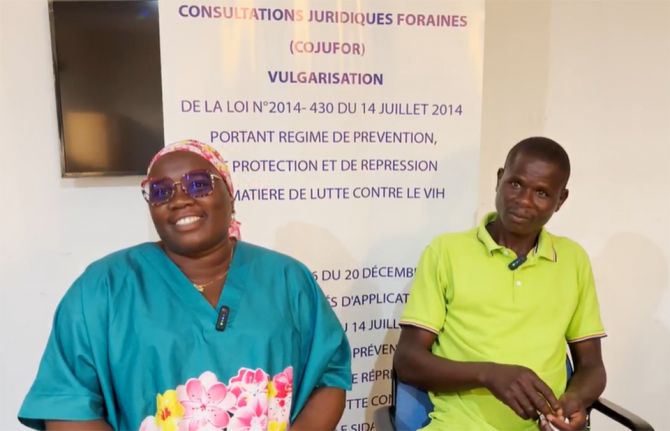
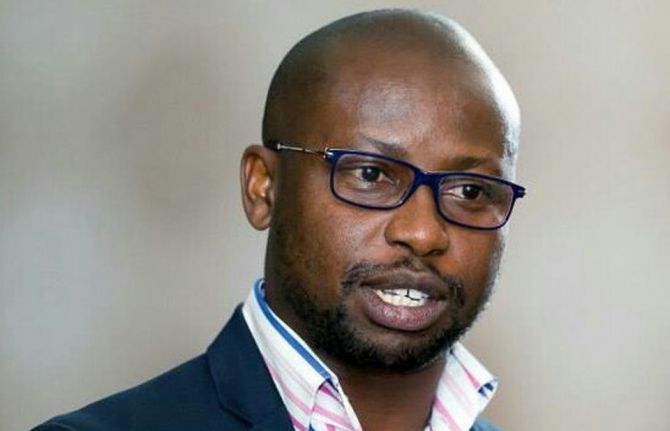
Update
African men fighting stigma and discrimination
16 May 2017
16 May 2017 16 May 2017In the lead-up to IDAHOT (the International Day against Homophobia, Transphobia and Biphobia) 2017, UNAIDS spoke with Kene Esom, the Executive Director of AMSHeR. AMSHeR promotes non-discrimination, particularly discrimination based on sexual orientation and gender identity, and advocates for access to quality health services for lesbian, gay, bisexual and transgender people in Africa.
Question: Tell us about the changes across the African continent since AMSHeR started nine years ago
AMSHeR was established to address discrimination and human rights violations based on sexual orientation and gender identity, the disproportionate vulnerability to HIV of men who have sex with men and the policy and social barriers that hinder access to services for lesbian, gay, bisexual and transgender (LGBT) people in Africa.
African LGBT people are bringing the issues of sexual orientation, gender identity and human rights into regional and global policy and legal spaces and are making the African LGBT experience the basis of policy, service delivery and funding decisions on Africa.
Never before has there been more visibility and interest in LGBT issues and understanding of the experience and needs of African LGBT people and effective representation of African LGBT communities in the global discourse. This is largely because of AMSHeR’s courageous mandate to make African LGBT people the faces and voices of inclusion in Africa and by so doing put LGBT inclusion on the agenda of African states and policy-makers as well as human rights and social justice movements.
Question: What made you focus your recent campaign on engaging with faith leaders?
It is widely accepted that religion and religious leaders have a great influence on political leaders and in African society. The widespread intolerance, discrimination and violence against people based on their real or perceived sexual orientation, gender identity and expression, and lack of access to health services, may be attributed to a highly religious environment that has normalized heterosexuality and patriarchy while demonizing sexual diversity.
Religion-inspired discrimination is very rife, particularly in Africa. The experiences of African LGBT people have been varied, from torture and inhumane treatment in the form of exorcism and conversion therapy, to mob violence incited by religious leaders from the pulpits, to the experiences of religious leaders sitting on national health agencies blocking attempts to provide health and rights services to LGBT people, to religious leaders actively sponsoring discriminatory legislation.
Religious leaders, because of their respected positions in society, are critical in addressing issues of stigma and discrimination as well as upholding the rights of all people regardless of sexual orientation, and, even more importantly, have emerged as strategically placed in discourses on HIV, sexuality and spirituality.
AMSHeR appreciates the role that religious leaders play, but at times they perpetuate discrimination based on sexual orientation and gender identity, and that is why, since 2015, under our Integrating Spirituality and Sexuality project, we have been working with religious leaders and LGBT people of faith to address these issues.
We have partnered with leaders of faith-based communities to initiate dialogue between institutions and LGBT communities in order to find common ground to integrate spirituality and sexuality. This has been done following lessons learned on how faith-based organizations have been integral in advocating for non-discrimination and stigma against people living with HIV. Faith-based organizations have proved to be allies to many civil society organizations in pushing for non-discrimination and stigma against people living with HIV.
As part of its work, AMSHeR has released a documentary, Queer Voices of Faith, for IDAHOT 2017.
Question: You are a Nigerian working in South Africa for a pan-African organization. What motivates you?
Whether in Nigeria, South Africa, Mozambique or Morocco, I am amazed at the remarkable kindred spirit that connects African societies. I consider myself a pan-Africanist, I believe there is more that connects us than otherwise, despite our diversities, and I celebrate Africa’s diversity and the values that unite us.
AMSHeR has been a perfect vehicle to express my pan-African ideals and promote the quest for social justice across Africa.
Question: What do you see as the future on the continent for LGBT people?
The future of LGBT people in Africa is to strengthen the movement that is now under way in which LGBT people, their leaders and other advocates are steadily seeking to realize their fundamental human rights, including the rights to equality and non‐discrimination, the highest attainable standard of health, freedom of expression, freedom of association and assembly, freedom from unlawful arrest and detention and equal access to justice.
I see a future and it is a bright one. A lot has changed since 2009, when AMSHeR came into operation. We have taken and continue to take incremental steps towards achieving the full inclusion of African LGBT people as equal citizens of Africa. The tide is flowing in one direction and it is in the right direction.
Question: This year’s theme for IDAHOT is family. What does family mean to you?
Family is a bond of love as opposed to biology and all families, in whatever shape or form, should be afforded the same protection and recognition from a legal and ideological perspective. Africa is replete with different expressions of family and we celebrate the role that families play in shaping society. It is also imperative to acknowledge that it is through families that we can reframe respect for diversity and unlearn the prejudice that is at the root of the discrimination that LGBT people face today.
Related
 “Who will protect our young people?”
“Who will protect our young people?”

02 June 2025

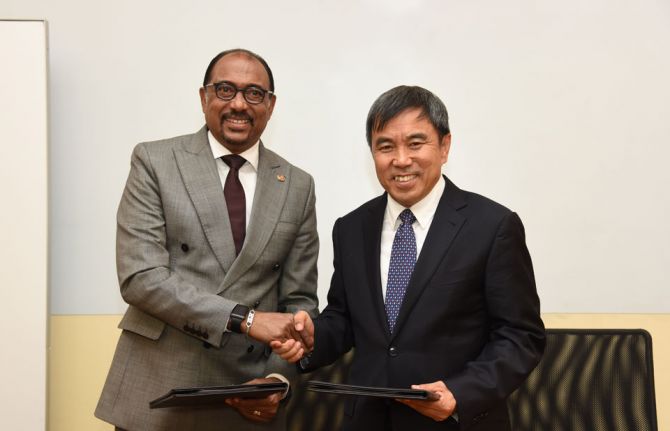
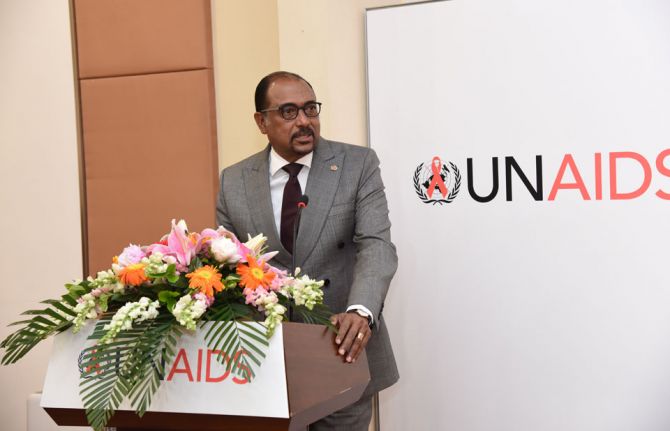
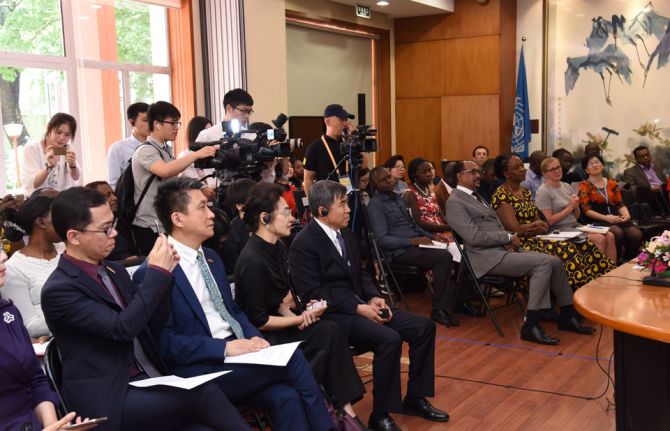
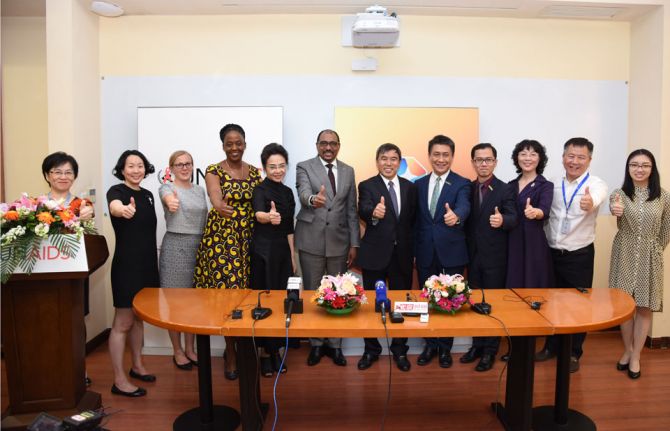
Update
UNAIDS and StarTimes sign partnership to leverage better health across Africa
15 May 2017
15 May 2017 15 May 2017UNAIDS and the Chinese media group StarTimes have signed a two-year memorandum of understanding to raise awareness about HIV in Africa and to work together to end the AIDS epidemic. UNAIDS Executive Director Michel Sidibé and StarTimes’ President Pang Xinxing sealed the partnership during a meeting in Beijing, China, on 12 May.
Mr Sidibé thanked StarTimes for promoting cultural exchange between China and Africa. He said he believes strongly that the Chinese broadcaster plays a key role in reaching people, particularly in Africa.
During World AIDS Day 2016, two UNAIDS videos played on StarTimes’ African network in 30 countries, reaching millions of people in English, French and local languages.
The videos promoted the life-cycle approach to HIV prevention, which involves finding HIV solutions for everyone, at every stage of life.
Mr Pang reiterated StarTimes’ commitment to ending the AIDS epidemic. He said that StarTimes will use satellite technology to improve access to television throughout Africa.
StarTimes has agreed to provide media support and global outreach during UNAIDS campaigns, notably World AIDS Day 2017 and Zero Discrimination Day 2018.
Quotes
“StarTimes is honoured to be joining hands with UNAIDS and signing a memorandum of understanding. We are committed to supporting efforts to end the AIDS epidemic.”
“I look forward to expanding our collaboration with StarTimes across Africa. I am excited about StarTimes’ mandate to connect 10 000 villages to satellite TV and its potential for health promotion across the continent.”
Region/country

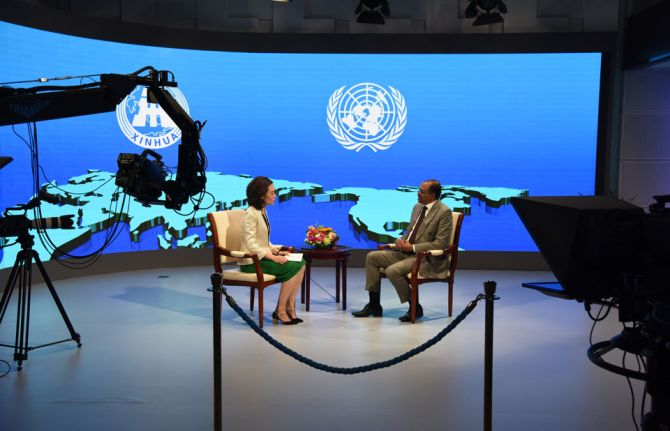
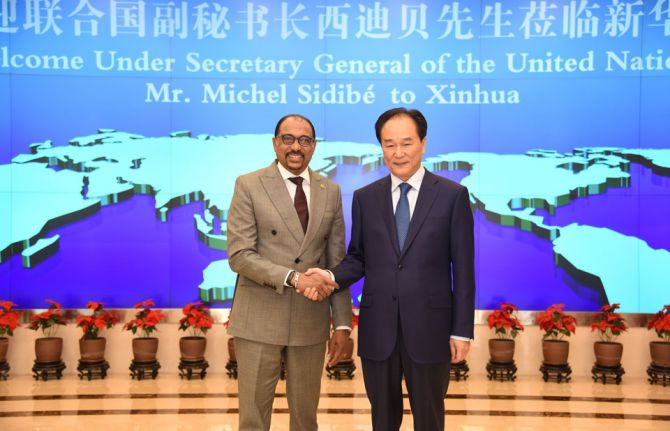
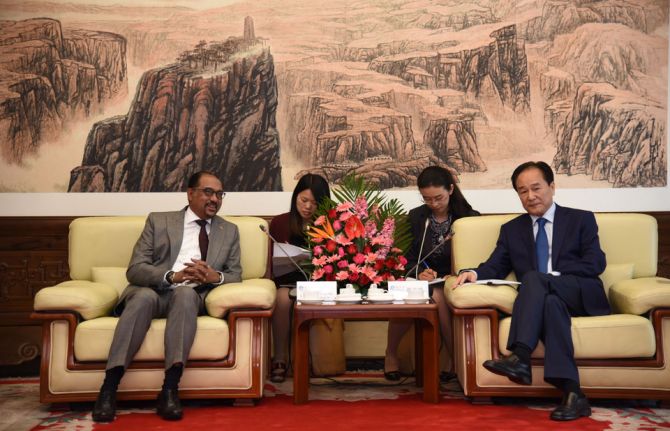
Update
UNAIDS and Xinhua partnership brings the common goal of ending AIDS closer
12 May 2017
12 May 2017 12 May 2017In the lead-up to the Belt and Road Forum in Beijing, China, the UNAIDS Executive Director, Michel Sidibé, visited the headquarters of the Chinese news agency Xinhua, where he was interviewed on television.
Mr Sidibé met with Cai Mingzhao, the President of Xinhua, to discuss a highly successful partnership between the two organizations, through which the news agency has helped to promote important messages about ending AIDS. During the 2016 United Nations General Assembly High-Level Meeting on Ending AIDS, held in New York, United Sates of America, a UNAIDS video played on Xinhua’s screen in Times Square.
Mr Sidibé stressed how the news agency is a key partner through its efforts of reaching billions of people with life-saving messages. He added that their continued involvement is critical for China–Africa health cooperation and to keep HIV on the global agenda.
Building bridges together is key, said Mr Cai, who reiterated Xinhua’s commitment to raising awareness and advocating around key issues related to ending the AIDS epidemic in China and globally.
The UNAIDS–Xinhua partnership dates back to 2011. Since then, two memorandums of understanding have been signed. Efforts carried out during the past six years include global media campaigns to promote public awareness of HIV and support for World AIDS Day activities.
The Belt and Road Forum, taking place on 14 and 15 May, aims to promote ties and cooperation between countries through the development of two major economic development projects—the Silk Road Economic Belt and the 21st Century Maritime Silk Road. In his television interview, Mr Sidibé highlighted that the Belt and Road initiative is an important platform for person-to-person connectivity—an issue that the AIDS response has championed.
Quotes
“Xinhua attaches great importance to its partnership and cooperation with UNAIDS. Our bilateral friendship is part of Xinhua’s social responsibility.”
“Xinhua is a critical partner for UNAIDS. Through Xinhua we can reach people who are left behind and who do not have access to information.”
Region/country



Update
Jenna Ortega brings attention to HIV at WE Day
10 May 2017
10 May 2017 10 May 2017Actress Jenna Ortega has spoken about her work with UNAIDS and encouraged young people to get involved in ending the AIDS epidemic. Speaking at WE Day—a celebration of thousands of young people around the world dedicated to bringing about positive change—in Seattle, United States of America, she highlighted not only the impact that AIDS has on young people around the world, but also that young people are an important part of the solution.
The WE Day event, held on 21 April, saw speakers and performers, and tens of thousands of young people, celebrate a year of action—in schools, in communities and at the national and global levels—that has transformed communities and changed lives.
Her commitment to the AIDS response has led Ms Ortega to use her television and social media platforms to reach out to young people, particularly around the need to stop HIV-related stigma. She is also encouraging young people globally to contribute to ending AIDS through the #GenEndIt movement.
Ms Ortega is featured in this month’s cover story of A&U magazine, which focuses on AIDS-related issues, where she talks about her passion for the AIDS response and her growing work with UNAIDS.
Quotes
“I want to help eliminate the stigma of AIDS and get people talking about it. Make it normal. Bring it up. It's a disease that affects all of us.”
“WE Day is a platform for artists to shed light on the causes that matter most to them. Jenna is an amazing young change-maker and her commitment to the AIDS response and other worthy causes is an inspiration to all. It's a powerful message when young people share their passion for good with other young people making extraordinary things happen.”

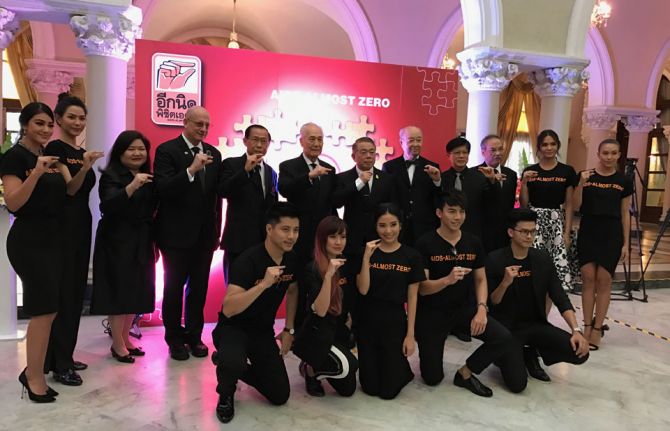
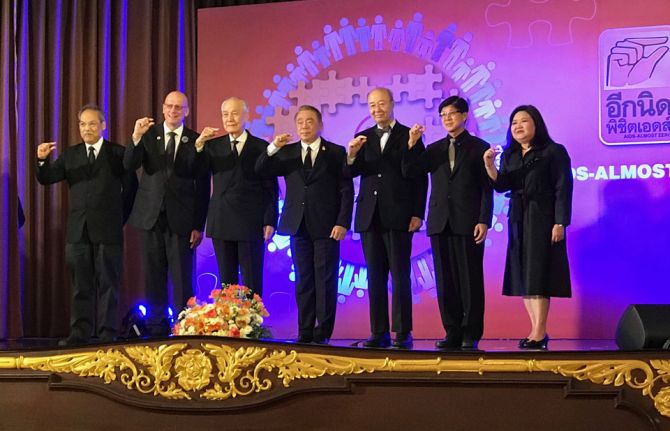

Update
Private sector and civil society launch AIDS fund for community groups in Thailand
10 May 2017
10 May 2017 10 May 2017Thailand’s private sector has teamed up with civil society to launch the AIDS Almost Zero campaign, which aims to raise funds for HIV prevention initiatives run by community groups of key populations. Admiral Narong Pipatanasai, Deputy Prime Minister of Thailand, opened the campaign at the Government House of Thailand in Bangkok on 8 May.
Since the early days of Thailand’s epidemic, civil society has a played a crucial role in the HIV response by helping to reach key populations, including sex workers, gay men and other men who have sex with men, people who inject drugs and transgender people. However, much of the funding for community organizations has come from international funding, which is no longer available since Thailand has attained middle-income status.
Since early 2015, UNAIDS in Thailand has been working with more than 30 civil society organizations to develop a resource mobilization consortium, which would help to cover the funding gap left by the withdrawal of international resources. In 2016, the consortium, led by the Raks Thai Foundation and the Thai National AIDS Foundation, organized a series of consultations with private sector representatives that were chaired by Anand Panyarachun, the former Prime Minister of Thailand. Thailand’s leading property developer, Sansiri Public Company Limited, participated in the consultations and provided financial support for the development of the AIDS Almost Zero campaign.
The speakers at the launch included Mechai Viravaidya, former minister of the Prime Minister’s office, Promboon Panitchpakdi, Executive Director of the Raks Thai Foundation, and Steve Kraus, Director of the UNAIDS Regional Support Team for Asia and the Pacific.
The aim is to raise US$ 1.4 million in 2017. At the launch, organizers announced that more than US$ 60 000 had already been secured from the Siam Commercial Bank, the Sansiri Public Company and other donors. One promoter for Thai boxing plans to organize a match at one of the country’s most famous boxing stadiums, with some of the proceeds going to the fund.
Quotes
“This project is significant because it mobilizes financial support, human support and pro bono services from the private sector for civil society and complements public financial support to achieve ending AIDS by 2030.”
“Today we forget about AIDS. Teenagers do not know about HIV. It’s time we wake up and start raising HIV awareness again.”
“We don’t have enough domestic budget for HIV prevention, so we are launching a collective fundraising effort.”
“It is good to see people from the private sector paying attention to the agenda, but we must not stop pushing. Ending AIDS is an ambitious goal but not impossible if everyone helps.”
“Social responsibility is about everyone, not just the government. We as a Thai corporation have a responsibility, an obligation, to make the country better.”
“We want to donate funds to make our society better and I think sports can help raise awareness about HIV.”
“We have always understood that when government works with civil society, great things happen. Now we are working with the private sector, which is very exciting.”
Region/country

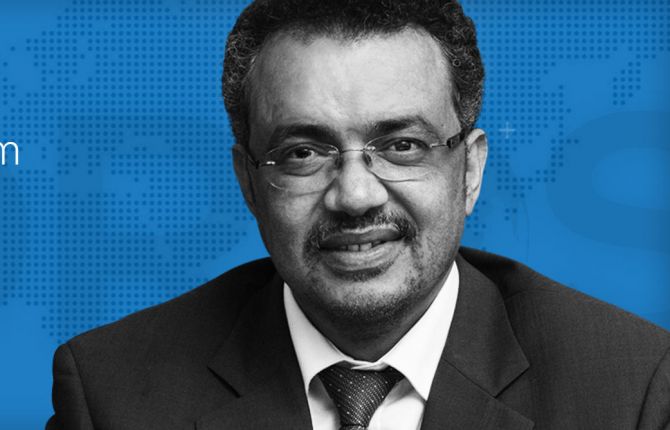
Update
Interview with Tedros Adhanom Ghebreyesus, WHO Director-General elect
24 April 2017
24 April 2017 24 April 2017The World Health Organization Member States elected Dr Tedros Adhanom Ghebreyesus as the new WHO Director-General on 23 May 2017 during the World Health Assembly.Dr Tedros will begin his five-year termon 1 July. Ahead of his election, Dr Tedros talked to unaids.org about the AIDS epidemic and the broader global health landscape.
Question: As Director-General of the World Health Organization, what will be your three priorities to advance progress in ending AIDS by 2030 as part of the Sustainable Development Goals?
Over the last 20 years, we have made tremendous progress on combating AIDS. I commend the advocacy and leadership role of UNAIDS in achieving these results and coordinating and harmonizing the United Nations system’s response to the AIDS epidemic. If elected as Director-General, I will have the following three priorities as part of the health sector AIDS response.
First, I will champion efforts to sustain the progress we have made so far without complacency and to renew our commitments to end AIDS as a public health problem by 2030. The global commitment for the Sustainable Development Goals offers a profound opportunity to tackle the structural, social and economic changes needed to end AIDS. I will ensure the World Health Organization (WHO) is part and parcel of these efforts, working alongside UNAIDS, the United Nations system, Member States, civil society and community groups.
Second, my topmost priority as Director-General of WHO will be universal health coverage, and I will work to ensure that each person living with HIV has access to the HIV prevention, treatment and care services they need. We will give due emphasis to HIV prevention and addressing comorbidities, such as HIV-associated tuberculosis, as well as the growing concern of noncommunicable diseases. Universal health coverage will also help key HIV populations, such as sex workers, men who have sex with men, people who inject drugs, transgender people, migrants and adolescents, reach HIV prevention, treatment and care services. WHO will provide Member States with the normative tools, guidance and support they need to implement these policies.
And finally, I would prioritize building strong, community-based health systems which can design and implement locally tailored prevention and treatment programmes. This will include strengthening primary health-care systems to deliver HIV prevention, treatment and care. Ensuring investment in health systems will not only help us manage HIV/AIDS, it will also support our efforts to prevent and treat other communicable and noncommunicable diseases, as well as prevent and respond to future health emergencies.
Question: How important do you feel the lessons learned in the AIDS response are in shaping the future of global health?
I have no doubt that the lessons we learned in the AIDS response have been critical to shaping the future of global health, both in terms of what we need to do and how we need to do it. The AIDS response first and foremost taught us the importance of political advocacy, community mobilization and determination to overcome despair with ambition and solidarity. The lessons of the AIDS response showed us the value and power of multistakeholder engagement and that we cannot address a health issue at its root only by focusing on the health sector. We also learned that with global solidarity we can innovate and mobilize dramatic domestic and international resources for health, which not only had a profound impact on HIV, but also on the broader health system. For example, when I was a Minister of Health of Ethiopia, we created a 2% HIV Solidarity Fund (a pool fund of 2% salary contributions of civil servants) to initiate our HIV treatment programme. Particularly in the face of changing political climates, we need this type of creativity, commitment and multisectoral response as we work to place universal health coverage at the centre of the implementation of all Sustainable Development Goals.
Question: As the AIDS response has scaled up to reach millions, one of the key challenges has been the lack of community health workers and the capacity of the health system to deliver services at scale. How will you address the challenge of building up the health system to prepare for the next disease outbreak and to meet current health challenges, including AIDS and noncommunicable diseases?
Scaling up community health workers and health system capacity must be a fundamental component of our efforts to achieve universal health coverage, which will be my topmost priority if elected as Director-General. These efforts can build on the tremendous progress made and experiences gained in the last two decades tackling HIV, tuberculosis, malaria, neglected tropical diseases, and child and maternal mortality. As part of this effort, we also need to strengthen primary health-care systems with integrated community engagement to address communicable and noncommunicable diseases, such as cancer, heart disease, chronic respiratory diseases, diabetes and injuries. These efforts will help not only to deliver evidence-based health promotion, prevention, treatment and rehabilitation services, but also to enhance prevention, detection, response and recovery efforts for health emergencies.
As Director-General, I will build on my first-hand experience addressing this capacity gap in Ethiopia to support Member States and national health authorities’ efforts to develop and implement policies aimed at ensuring universal health care. In Ethiopia, for example, our flagship Health Extension Programme deployed nearly 40 000 community health workers in every village of the country. HIV prevention was one of their key activities—a focus which has resulted in a 90% reduction of new HIV infections between 2001 and 2012. WHO has a key role to play in sharing these types of lessons learned across countries. It also needs to help build and maintain partnerships among the diverse group of players involved in global health—country governments, donors, the private sector, civil society and academics—to overcome barriers to achieving universal health coverage, including improving access to quality diagnosis and care, essential drugs and financial protections. Finally, I will also work to put and keep universal health coverage on the agenda at the highest political levels possible, maintaining the political will and resources needed to achieve these goals.
Question: How will you ensure that people affected by HIV, especially key populations, such as sex workers, gay men and other men who have sex with men, people who inject drugs, transgender people and migrants, are not left behind in efforts to achieve universal health coverage?
Our efforts to achieve universal health coverage need to prioritize the needs of the vulnerable and marginalized. Specifically, I believe WHO must champion mechanisms to meaningfully listen to, learn from and engage these groups. This engagement—and what we learn from it—should then be at the centre of our efforts to mobilize resources and hold authorities accountable for the health of all, regardless of age, gender, income, sexual orientation or religion. In addition, it will be essential to improve our evidence base around effective ways to reach the most vulnerable and most marginalized. New research can help us develop data-driven and results-oriented solutions, which will help us maximize the impact of interventions we invest in. Part of this effort will also require us to build and improve the infrastructure for data collection and ensure that the data we collect are used to inform policies. Lastly, WHO is ideally positioned to address inequality in health care, and, if I am elected Director-General, I will be a strong voice and committed champion to ensuring everyone has the right to health care.
Question: What does UNAIDS mean to you?
I will start with a personal note. It has also been a great pleasure and honour to have had a chance to chair the Programme Coordinating Board (PCB) during my time as Ethiopia’s Minister of Health in 2009–2010, and to consider UNAIDS a close partner for more than a decade. It was during my time on the PCB that UNAIDS increased its focus on health systems strengthening and HIV prevention, including country ownership—setting the stage for our universal health coverage efforts. We also worked to implement the new UNAIDS mission statement, which outlined its priorities and vision for the future.
I believe UNAIDS’ provocative leadership has been critical in addressing the AIDS epidemic and converting it from a death sentence to a chronic health condition. Its global role has not only garnered the highest political support for the AIDS response, but also ensured the voices of those affected by HIV and their families are at the centre of the response, including placing civil society within its governance structure. I believe consolidating these experiences will be useful to tackle the structural, social and economic changes needed to end AIDS as part of the Sustainable Development Goals. I also take note of the recent recommendations of the Global Review Panel on the Future of the UNAIDS Joint Programme Model.
If elected Director-General of WHO, I would look forward to continuing our work together and our close partnership.
Resources

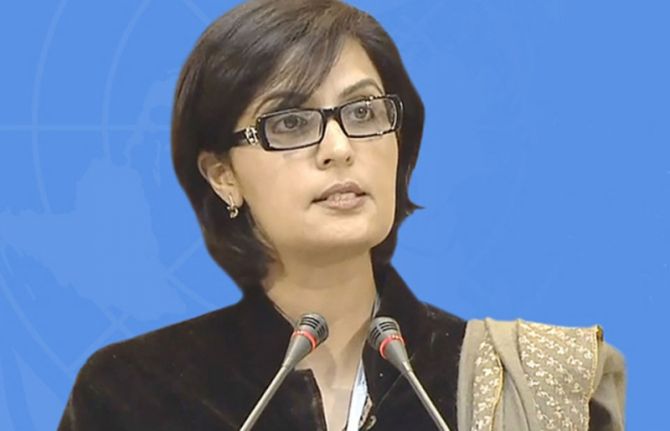
Update
Interview with Sania Nishtar, candidate for WHO Director-General
24 April 2017
24 April 2017 24 April 2017Question: As Director-General of the World Health Organization, what will be your three priorities to advance progress in ending AIDS by 2030 as part of the Sustainable Development Goals?
To defeat the epidemic, the World Health Organization (WHO) needs to continue work in partnership and push the ambitious agenda approved at the United Nations General Assembly High-Level Meeting on Ending AIDS. Universal access to early safe treatment—getting to universal coverage still needs a lot of work—and countries need support to be able to work out how to deliver lifelong treatment. WHO will strive to be sure that we are on top of the evidence and able to fail fast and fix fast as new evidence sheds light on how to reach people and sustain them on treatment to reduce the community viral load.
Only then can we expect to curb transmission. For prevention—while we now have some effective interventions to programme—we still need to add to our toolkit and WHO will work to ensure new evidence and experience is brought into programmes as quickly as feasible. Addressing HIV requires universal health coverage for the core evidence-based package, a rights-based approach and an understanding of the key role of social determinants.
With that in mind we need to focus on ending transmission. This means continuing to promote universal testing and treatment, with a focus on the most vulnerable groups, including adolescent girls and people who use drugs, understanding the value of pre-exposure prophylaxis and, of course, ultimately we need a vaccine.
WHO’s role in this is to continue to provide evidence-based policy guidelines and build up our toolkit to make progress towards universal health coverage. We know that countries are struggling to implement the existing guidelines. WHO needs to continue to bring rigor, evidence and a public health approach to the response so that we can provide practical and clear guidance on how to deliver services in different contexts (rural, urban) and to those people that don’t normally have contact with the health system.
WHO also needs to support countries to have the data and management systems in place to deliver a real-time public health response, with a view to actually preventing transmission.
Question: How important do you feel the lessons learned in the AIDS response are in shaping the future of global health?
The AIDS response more than any other has taught us four critical lessons for the future of global health. The power of ambition, power of community engagement, the benefits of a multisectoral response and lessons to reorient acute-care health systems towards chronic disease management.
On the first point, the AIDS community was one of the first to push for universal access. Seen as heretical at the time, the AIDS community said everyone, everywhere can and should be treated. Through South–South cooperation antiretrovirals were made accessible to those that needed them most and millions of people are now alive because of it.
Second, the AIDS response has shown us that the community matters and health is everybody’s business. Community health workers trained in treatment literacy were key to breaking down social stigma and encouraging people to get tested and to take up treatment.
Thirdly, the AIDS response has shown us the power of partnership and while the outcome of a disease may be a health outcome (e.g. people get sick or die) prevention and treatment on a universal scale requires engagement of all players—government, private sector, faith-based organizations, community-based organizations, civil society, academia—and all sectors—education, food security, water and sanitation, transportation.
In the fourth place, the scale-up of services in lower-income countries has created the first large-scale continuity care programmes. Although HIV and chronic noncommunicable diseases (NCDs) are thought of as different challenges, there are many commonalties, as far as the health systems response is concerned, since the availability of treatment has transformed HIV into a chronic condition. HIV programmes have developed the systems, tools and approaches needed to support continuity of care. These lessons can help in mainstreaming the management of NCDs in country health systems planning.
Overall, we have also learned that we cannot see any disease area in isolation—to address HIV/AIDS we need an effective, strong system, which means people, funding, hardware, leadership and data to drive decision-making.
Our experience with HIV has shown us the shortcomings of systems built around one-time episodic care and that success is only possible when the beneficiary and the provider embark on a journey together as part of the continuum of care. As countries are grappling with a declining burden of communicable disease and a rise of NCDs, we need to build strong health systems that are sustainable and more responsive. This requires a long-term view focused on both people and systems.
Question: As the AIDS response has scaled up to reach millions, one of the key challenges has been the lack of community health workers and the capacity of the health system to deliver services at scale. How will you address the challenge of building up the health system to prepare for the next disease outbreak and to meet current health challenges, including AIDS and noncommunicable diseases?
Here you raise three separate but important issues: the lack of health workers, the need to deliver services at scale and the challenge of building health systems, and how best to prepare for the next disease outbreak.
First, community health workers form the backbone of health services in many countries—in many cases the health workers are women. We must do better in remunerating these women on time for their work, as a pure volunteer model is not sustainable in the long run if we want to retain this part of the workforce. More broadly, implementation of the recommendations of the High-Level Commission on Health Employment and Economic Growth will work well, both for addressing health workers’ shortages as well as economic growth and health systems strengthening, overall.
I have always believed that strong health systems can deliver on any disease-specific goal. In fact, this has been the message of my book, Choked Pipes. In addition to disease-specific targets, strong and effective systems can also be crucial for the response to pandemics. I will ensure WHO embarks on a course to strengthen the international framework to coordinate and consolidate efforts towards the achievement of universal health coverage, with health systems strengthening as one of its key features. This will also include efforts to overcome systemic barriers and address collusion in health systems, and provide technical support to countries to develop new stewardship mechanisms to tap the potential of providers of services in the non-state sectors, which play a predominant service delivery role in many parts of the world. Under my leadership, WHO will promote universal health coverage as a health policy goal for all countries, and will help ministries of health galvanize commitment at the head of state level. Embracing universal health coverage means building on previous commitments to primary health care and including long-term social policy commitment, domestic resource allocation and a move linking coverage for essential services to financial risk protection.
Finally, on disease outbreaks, there are actions to be taken both in countries as well as within WHO. WHO must work more effectively with Member States to enhance their core public health capacities as demanded by the International Health Regulations. Improvement in disease surveillance will improve health planning, and quick detection and response to outbreaks will save lives. Internally within WHO a new Health Emergencies Programme has been initialized, which I am strongly supportive of and which I will strengthen as a priority.
Question: How will you ensure that people affected by HIV, especially key populations, such as sex workers, gay men and other men who have sex with men, people who inject drugs, transgender people and migrants, are not left behind in efforts to achieve universal health coverage?
Everyone has a right to health. As with all areas of its work, while recognizing the criticality of national sovereignty, to fulfil its mandate of health for all, WHO must also be the steward and champion of both the right to health and a human rights approach to health.
The 2030 Agenda and the Sustainable Development Goals reaffirm the responsibility of Member States to “respect, protect and promote human rights, without distinction of any kind as to race, colour, sex, language, religion, political or other opinions, national and social origin, property, birth, disability or other status,” signalling a renewed commitment to human rights in the coming global health and development agenda.
Throughout my work as a doctor, in government, civil society, academia and working with international agencies, I have always based my work on the foundation that everyone has the right to quality health services. It was this strong grounding that led me to set up an innovative financing facility in Pakistan that assists the poorest and most marginalized communities to avoid catastrophic expenses when accessing health. I will continue to walk the walk on the right to health as Director-General of WHO.
Question: What does UNAIDS mean to you?
UNAIDS was one of the first examples of a partnership that harnessed the strengths and core competencies of all the United Nations agencies. Under the stewardship of UNAIDs, the United Nations has driven an ambitious agenda, and collectively we have pushed farther and faster towards ending the epidemic—ambitious goals for access to treatment and prevention of mother-to-child transmission of HIV are being met in some countries, and, for the first time, epidemic control and ending transmission seems as possible in a handful of African countries hardest hit.
UNAIDS has also played a key role to keeping a human rights-based approach to our response and ensuring that access to critical prevention and treatment is extended to key populations at risk, including harm reduction for intravenous drug users, and adolescents. UNAIDS has also led the way on how we in health can work with multiple actors—civil society, communities, volunteers and the private sector—to improve coordination and to better leverage the skills, experiences and resources of partners.
Resources
Related

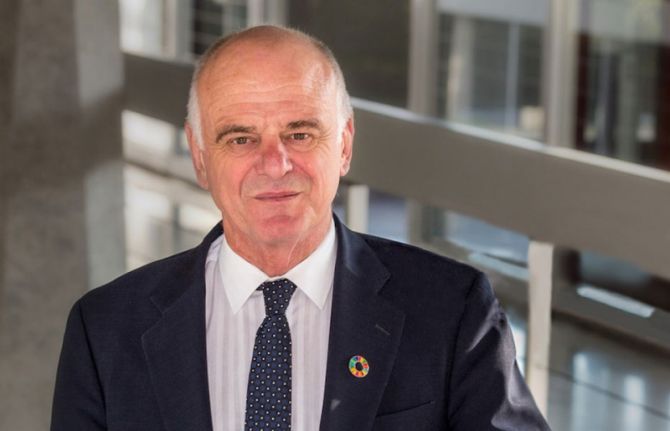
Update
Interview with David Nabarro, candidate for WHO Director-General
24 April 2017
24 April 2017 24 April 2017Question: As Director-General of the World Health Organization, what will be your three priorities to advance progress in ending AIDS by 2030 as part of the Sustainable Development Goals?
The first priority must be to stop tackling HIV/AIDS as an isolated issue and make services for people affected by HIV/AIDS an integral part of universal health coverage, and also linked with services for other chronic diseases.
The second is to review the lessons of work to empower people at risk of HIV/AIDS using a Sustainable Development Goal (SDG) lens and then use the information derived from this review as a basis for mainstreaming HIV-related action across all the SDGs (see below).
Just as the AIDS movement redefined public health between 2000 and 2015, it now needs to help bring public health into the SDGs with a completely new narrative. This narrative must emphasize the interconnections between the SDGs and the need to leave no one behind, and show that health is central to achieving this.
Question: How important do you feel the lessons learned in the AIDS response are in shaping the future of global health?
The response to AIDS taught us a great deal, and was extremely important in shaping global health. First of all, it taught us to focus on the people and patients, as opposed to the medical condition or the virus. By shifting the focus in this way, the movement was effective in engaging civil society and a wide range of actors in combatting the condition, and, importantly, also the stigma attached to it. The second important issue brought to light in the AIDS response was ensuring that all persons at risk—whatever their place in society—were able to have full access to the services they needed: leaving no one behind. Hard work was done to ensure that HIV status, a person’s gender, sexual preference or substance use should never be an excuse for discrimination, which is certainly crucial to all global health areas of work. Thirdly, the AIDS response demonstrated the importance of multistakeholder and intersectoral approaches and broke new ground in providing a good model of how to work in an integrated way across agencies on complex health issues within the United Nations.
Question: As the AIDS response has scaled up to reach millions, one of the key challenges has been the lack of community health workers and the capacity of the health system to deliver services at scale. How will you address the challenge of building up the health system to prepare for the next disease outbreak and to meet current health challenges, including AIDS and noncommunicable diseases?
Governments are increasingly focused on how best to develop health-care infrastructure and staffing so that all people are enabled to access essential health care while—at the same time—ensuring that there are appropriate facilities within which care can be offered to persons who have or are at risk of HIV/AIDS, providing them with health services and lifestyle information. Governments seek to ensure that procurement mechanisms for AIDS medicines work well and enable people in need to access the medicines and take them as directed. They also work hard to ensure the necessary political support to ensure that health infrastructure is rolled out in ways that are sensitive to the needs of people living with HIV. The services offered should take account of the reality that people living with HIV may well end up developing noncommunicable diseases. To this end, national authorities in several countries are looking for ways to incorporate AIDS care within the programmes for chronic diseases. All governments will wish to encourage regional and global collaboration on funding, on technical assistance, on ensuring access to medicines and diagnostics and on securing access to vaccines as they become available.
Question: How will you ensure that people affected by HIV, especially key populations, such as sex workers, gay men and other men who have sex with men, people who inject drugs, transgender people and migrants, are not left behind in efforts to achieve universal health coverage?
I see many examples of health professionals, civil society, faith groups, the United Nations and others with an interest working with governments with a view to reducing the stigma in relation to persons who are at risk of HIV and reducing the extent to which they are subject to discrimination that results in their not being able to have proper access to care. To be better able to do this work, health professionals and other stakeholders need support so that they can practice in ways that reduce stigma and discrimination, need access to evidence, need to be able to interact with the general public and need to be able to work closely with each other in solidarity, as it can be challenging and difficult work associated with setbacks as well as successes.
Question: What does UNAIDS mean to you?
UNAIDS is a very important expression of the spirit and solidarity with which we all need to work together to empower actions that will lead to a reduction of the disadvantage and suffering experienced by people who are at risk of HIV and AIDS, as well as those who are actually affected by the disease. It has had a powerful influence on the behaviour not only of the United Nations system but of the whole community of actors engaged in ensuring equitable access to requirements for HIV/AIDS prevention, diagnosis and treatment.
Resources
Related


Update
Speaking in a united voice: new indigenous HIV group launched
08 May 2017
08 May 2017 08 May 2017Indigenous groups from all over the world have joined together to speak in a united voice on HIV.
The Canadian Aboriginal AIDS Network, the International Indigenous Working Group on HIV and AIDS and the Māori, Indigenous & South Pacific HIV & AIDS Foundation have together created a new nongovernmental organization, the International Indigenous HIV & AIDS Community (IIHAC).
“I am here to tell you that indigenous people have been left behind and, unless things change, we will continue to be left behind,” said Marama Mullen, Chair of the IIHAC, at its launch in New York, United States of America, on 24 April.
At the launch, IIHAC released a 10-point statement to serve as an action plan for indigenous communities all over the world. The statement urges national authorities to gather epidemiological data and undertake more research on issues such as stigma to discrimination and racism, and to ensure access to health, housing and educational and economic opportunities for indigenous people. IIHAC’s aim is to work together, pool resources and build resilient indigenous communities.
The statement also urges indigenous leaders to make access to HIV treatment a priority and to adapt the prevention movement with culturally relevant and community-driven strategies.
“Despite all the advances in HIV, despite all the goals and strategies, despite all the good will, this is the only way for us to be a part of the Fast-Track response,” Trevor Stratton, a board member of IIHAC, said. He added, “It is key that we pay particular attention to indigenous people living with HIV.”
Many indigenous communities have been affected by higher levels of substance abuse, poorer health and a higher HIV burden.
The group asked that the United Nations Permanent Forum on Indigenous Issues address AIDS as a humanitarian issue and HIV as a threat to indigenous peoples.
UNAIDS Deputy Executive Director Luiz Loures welcomed the creation of IIHAC, saying, “This is a crisis in indigenous communities that we cannot ignore.”
UNAIDS is committed to leaving no one behind in the HIV response towards ending the AIDS epidemic as a public health threat by 2030 as part of the Sustainable Development Goals.
Related

Update
Marc Angel calls to accelerate momentum towards achieving the 90-90-90 treatment targets
03 May 2017
03 May 2017 03 May 2017Ahead of the mid-term review of the 90–90–90 treatment targets in 2017, Marc Angel, Chair of Foreign Affairs and Development Committee of the Luxembourg Parliament and UNAIDS Champion for the 90-90-90 targets, undertook a multicountry fact-finding visit to Botswana, South Africa and Lesotho from 17 to 21 April. The visit provided Mr Angel with the opportunity to conduct high-level political advocacy to continue and accelerate momentum towards achieving 90–90–90 by 2020.
The fact-finding visits to southern Africa confirmed the importance of intensifying efforts to increase the proportion of people living with HIV who know their HIV status. In addition, the visits highlighted the central importance of community health workers, both to achieve the 90–90–90 targets and to ensure national preparedness to identify and address emerging health challenges.
What are the 90–90–90 targets?
- By 2020, 90% of all people living with HIV will know their HIV status.
- By 2020, 90% of people who know their HIV-positive status are accessing treatment.
- By 2020, 90% of all people on treatment have suppressed viral loads .
Modelling suggests that achieving these targets by 2020 will enable the world to end the AIDS epidemic as a public health threat by 2030, which in turn will generate profound health and economic benefits
Find out more here
In each country he visited, Mr Angel met with leaders from government and civil society to witness how 90–90–90 is being adopted in high-burden countries. He also visited numerous health facilities and community-based projects to experience first-hand how 90–90–90 is being implemented on the ground. All three countries have adopted and implemented the World Health Organization guidelines for universal HIV testing and treatment for all people living with HIV and have strong political commitment to reaching 90–90–90. The three ministers of health from each country agreed that community health workers must be the central mode of delivery for 90–90–90.
Quotes
“What I have seen in the field is that 90–90–90 is a reality, not only for government officials, but also for communities. Let’s use the next three years to keep the momentum going and indeed to push even harder to achieve our goal.”
“Witnessing how communities are on the Fast-Track to achieve 90–90–90 showed us how important community health workers are for the AIDS response, both in Africa and globally. It is clear that they play an essential role in achieving 90–90–90.”
“Leadership for the AIDS response is crucial. This includes community and traditional leaders, which the CATCH community-based HIV prevention project in Botswana demonstrates perfectly.”
“Currently the world is geared towards a curative health system. 90–90–90 will help us achieve a much-needed change to preventative health services, which will be a smart investment for high-burden countries, such as South Africa.”
“We made the decision to implement same day test and treat in certain locations based on the evidence of people being left behind. We will only succeed if we all pull together to ensure accountability, transparency and leadership for the AIDS response.”






